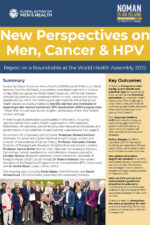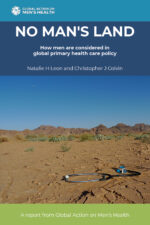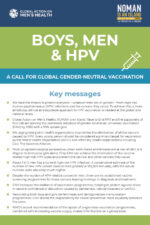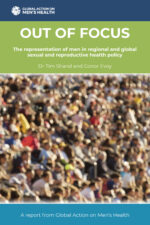Prostate Cancer: Time for a New Global Initiative
GAMH is calling for a new global initiative on the world’s second most frequently diagnosed cancer in men.
With cases of prostate cancer expected to double by 2040, we urge the World Health Organisation (WHO) to introduce a Global Prostate Cancer Initiative which covers every stage of the prostate cancer pathway from prevention to palliative care.
Our report, Prostate Cancer: Time for a New Global Initiative. A Policy Report, explains that prostate cancer is now the most frequently diagnosed cancer in men in 112 countries and the leading cause of cancer death among men in 48 countries. There will be almost three million new cases of prostate cancer a year by 2040 and the mortality rate will rise by 85%.
Every effort must be made to show down and reverse the trend. The rapid rise in prostate cancer cases is not just alarming it is also unnecessary and therefore unacceptable. Prostate cancer is currently inadequately addressed in global and national cancer policies. As a result, too many men are ill-informed about the disease, not enough is known about how it can be prevented, it is too often diagnosed too late, men cannot access the services they need, and men at greater risk of prostate cancer (including Black men and men with a family history of the disease) are not well-served.
The new Global Prostate Cancer Initiative needs to cover 10 key areas, including:
- National governments should be urged to introduce prostate cancer policies (or national cancer plans which specifically address prostate cancer) with clear KPIs (key performance indicators).
- Education programmes and awareness campaigns are required to tackle the need for more accurate information and the stigma that many men feel about prostate health.
- Early diagnosis is essential. As many countries as possible should begin to plan the introduction of organized national screening programmes.
- There must be a focus on men at highest risk of poor prostate cancer outcomes, particularly Black men, men with a family history of the disease and men with low socio-economic status.
- Men with prostate cancer need quick and free (or at least affordable) access to all effective treatment options and to be under the care of multi-disciplinary teams that can also provide appropriate psychosocial support.
- Investments in research, infrastructure, workforce development and treatments are required, especially in lower-income countries where prostate cancer mortality rates are currently disproportionately high.
GAMH’s Director Peter Baker, one of the report’s co-authors, said:
Globally, men’s health is unnecessarily poor with men living five years fewer than women. Prostate cancer contributes significantly to men’s burden of disease and, unless urgent action is taken, the number of cases will accelerate to the detriment of men themselves as well as their families and communities. Health systems, especially in middle and lower income countries, will also struggle to cope. That’s why Global Action on Men’s Health is calling for a new and comprehensive Global Prostate Cancer Initiative, led by WHO, to get ahead of the curve.
Derek M Griffith, Risa Lavizzo-Mourey Population Health and Health Equity University Professor at the University of Pennsylvania, GAMH Chair, and one of the report’s co-authors, said:
It’s essential that action is taken to reach the communities of men at greatest risk of poor prostate cancer outcomes, including Black men, men with a family history of prostate cancer, men with low incomes, and men who live in rural areas or in the Global South. These inequities must be addressed as a priority.
Professor Hein van Poppel, Chairman of the European Association of Urology (EAU) Policy Office and former Chairman of the Department of Urology at the University Hospital Gasthuisberg, Katholieke Universiteit (KU) Leuven, Belgium, said:
National prostate cancer screening programmes must play a central role in tackling prostate cancer, now the most common cancer in men in 112 countries and the leading cause of cancer death in 48 countries. Unlike many other cancers, it cannot be prevented and in its early stages, the disease has no symptoms that could enable early detection. And, if it is detected at an advanced stage, the 5-year survival rate can be as low as 30%. PSA testing combined with MRI scanning and risk assessment reduces the risk of overdiagnosis and can reduce deaths by 35%. The identification of low (and some intermediate) risk cancers allows safe monitoring, known as Active Surveillance, that minimizes overtreatment.
The publication of Prostate Cancer: Time for a New Global Initiative. A Policy Report marks the start of an advocacy campaign by GAMH to tackle this major issue in men’s and public health.
- The full report is available to view here.







